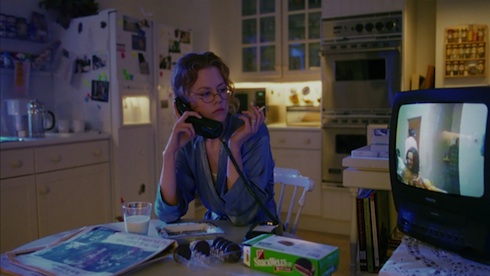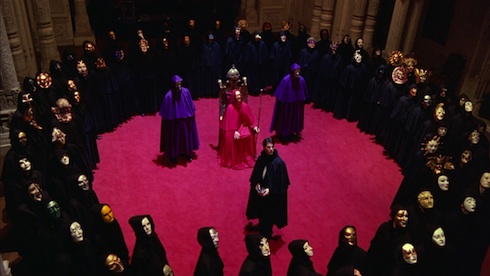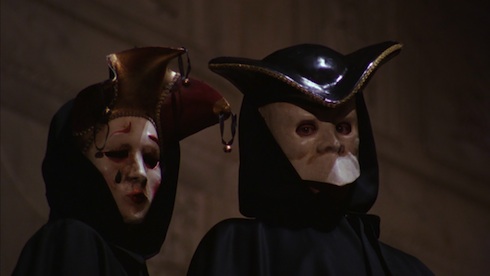When watching Eyes Wide Shut the other night—an experience I did not enjoy—it occurred to me that over the years my assessment of it as a movie has jumped all over the place. I’ve ardently defended it as an underrated masterpiece, reluctantly classified it as a misfire from one of my favorite directors, and numerous points in between. Almost nothing in its entire two hours and forty minutes is literally happening, and the audience is given very little warning that this is so, which means if anyone ever invents the genre “stealth fantasy,” Eyes Wide Shut will be its Lord of the Rings trilogy. It’s a movie far more enjoyable to ponder and discuss than it is to watch, though not without some excellent moments.
I do suspect that, even viewed through the most generous prism, it’s more of a critics’ movie than it is for general audiences. This isn’t to say that a non-critic watching a movie can’t approach it analytically, more to say that the average person lured into the theater with the promise of Tom Cruise and Nicole Kidman in some big sex movie probably isn’t going to know—or care—that the reason the movie’s pace is a little off is because Stanley Kubrick hadn’t quite finished fine-tuning the editing before he died, or that the novel it’s ostensibly based on, Arthur Schnitzler’s Traumnovelle, is actually the story that’s dreamed by Tom Cruise for 90% of the movie, presuming of course that this hypothetical audience member even knows—or cares—who Schnitzler was.
I do care about Eyes Wide Shut, because, although not by design of course, it’s the last picture one of America’s greatest filmmakers made. This is why it annoys me a bit when people tear it to shreds for things like not being a realistic portrayal of New York, even though the contrast of the second unit footage of the actual New York with Kubrick’s deliberately unrealistic sets really underscores that point. If Kubrick had survived to make a few more tweaks to the editing, I think it would have been a bit clearer that everything in the movie from when Tom Cruise takes the phone call in the middle of the argument with Nicole Kidman (the argument where it takes Nicole Kidman twenty times longer to say her lines than any human being has ever taken to say the equivalent number of words) to the very end when they take their daughter shopping in FAO Schwartz takes place inside Tom Cruise’s mind. The movie is, after all, based on a book called “Dream Story,” and most of that last conversation between Tom Cruise and the slow-motion Nicole Kidman is concerned with dreams. That part is fairly easy to sort out.

The problem is the other two-plus hours of the movie. Even if we take as a given that criticizing the realism of the events that unfold is beside the point because it’s a dream, we’re still left with the problem of it not being a terribly interesting dream. Tom Cruise’s character, Bill Harford, is a doctor to the extremely wealthy, whose patients regard him as a friend or even family. That this happened over a presumably very short period of time isn’t necessarily a problem. Maybe he’s just that good.
The problem arises with the impetus of his extended dream sequence: the discovery that his wife (Nicole Kidman, his wife in real life as well at the time) has fantasized sexually about someone other than him. I know a lot of men find this shocking, but think about it: if women didn’t have sex, how were you born? “Yeah, but I don’t like thinking about it” is not an excuse. Finding out your wife had a hot sex fantasy about a sailor—dude, seriously, a man in uniform? Of course she wanted to hit it, grow up—does not in any way justify going out, nailing hookers, and infiltrating Freemason orgies. Now, to Eyes Wide Shut‘s credit, it doesn’t try to sell us on the idea that any of those things Bill does are justified, but even in his dark sexual revenge fantasies….he never even gets laid! He stops himself before he sleeps with a pretty and friendly young streetwalker, just as he stops himself before getting freaky with the Freemasons (or whoever they are; maybe they’re those swingers from The Da Vinci Code?).

Even the non-sexual aspects of his fantasy have an oddly anachronistic feel to them, from the idea of a musician who can’t get a gig in Seattle in the 1990s (an idea roughly akin to a plastic surgeon being unable to make ends meet in Los Angeles), to sports bars with maitre ‘d’s, to the idea that every customer service person in New York City is a flirtatious English person (well, that one just feels like the movie was shot in England). Again, setting aside the realism issue, since this is a dream, there’s a generally old-fashioned feel to all of Bill’s interactions with people that make it feel like Bill is a very old man interacting with the modern world for the first time in about fifty years.
That is the biggest problem Eyes Wide Shut has. If Kubrick had made this same movie in 1969 with Warren Beatty and Julie Christie with no changes other than letting Julie Christie talk like a normal human being—seriously, I want to know what kind of horribly wrong line notes Kubrick gave to Nicole Kidman, it takes her five minutes to complete one sentence—it would have been revolutionary. Thirty years on, though, it’s an extremely well-photographed if structurally loose meditation on the importance of honesty in marriage with a lot of odd touches that distract from the picture’s point.
One thing I must say I was pleased to note, revisiting Eyes Wide Shut, is that Tom Cruise is really quite good in the lead. It’s his focused, completely committed performance that keeps Bill’s weirdly anachronistic fussiness about his wife being a sexual being from seeming utterly absurd. He almost, almost, convinces the audience that he’s simply a sheltered innocent. The problem is, the whole rest of the movie is working against him, and it takes entirely too long to make the ultimate point about the importance of both fantasy and honesty to a marriage that it does.
For Kubrick completists and critics, Eyes Wide Shut is essential. For anyone else, it’s less so. Its squeamishness about sex in general and kink in particular make me impatient, and Kubrick’s detachment from the modern world was showing, more to the detriment of this movie than any of his others. Still, for all the frustration it causes, it’s an ambitious, extremely well-made movie, a necessary caveat to any complaints about it being painful to sit through, which is itself a necessary caveat to any assessment of it as being ambitious and well-made. It’s, accidentally, a fair summation of Kubrick’s entire career: hard to pin down and, for better or worse, completely his.
Danny Bowes is a playwright, filmmaker and blogger. He is also a contributor to nytheatre.com and Premiere.com.










